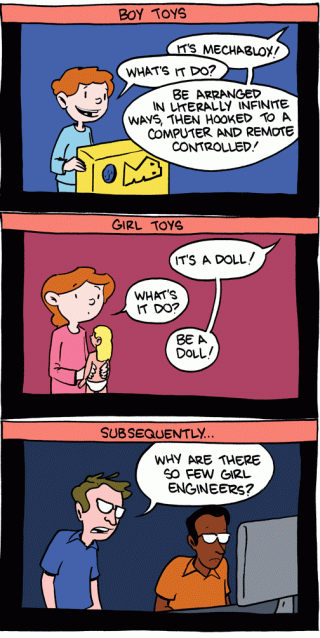
By Zach Weiner, via Saturday Morning Breakfast Cereal http://www.smbc-comics.com/index.php?db=comics&id=1883#comic
The perennial discussion about women in technology is in high gear once again, this time after remarks made by Y Combinator co-founder Paul Graham about the relative dearth of female tech founders and the perks of starting to code at a young age in an interview with The Information were picked up by Valleywag.
Discussions about career, gender and age with a dash of the inherent class associations that often accompany them are always dicey topics, so it makes sense that this interview hit a nerve. For his part, Graham (who, it should be mentioned, in interviews with TechCrunch has always expressed a very strong interest in funding more female founders and voiced pride in shifting the gender ratio in Y Combinator’s founder classes) says he’s been misquoted and misunderstood, and there are some very eloquent arguments being made that at least some of the pile-on seems to be unwarranted. That said, people on all sides of the debate are making good points, and will probably continue to do so for a while.
The real upshot of all this may be that more people are talking about solutions to the inequalities in tech. Because putting the controversy aside, there is one thing that isn’t really up for debate: There are still far fewer females in the technology industry than there are men. As Union Square Ventures’ Fred Wilson wrote in a very good blog post this morning,
“The brouhaha that [Paul Graham’s comments] unleashed about women founders, women coders, and women hackers is a good thing because we ought to be having a broader conversation about these issues.
Paul asks ‘God knows what you would do to get 13 year old girls interested in computers?’ and that is a damn good question”.
Wilson offers up some examples of initiatives tackling the problem full time, including Girls Who Code and Black Girls Code. He also referenced TechCrunch’s interview from this past October’s Grace Hopper Celebration of Women in Computing with Dr. Maria Klawe, who has nearly closed the gender gap at the elite Harvey Mudd computer science department since she joined the college as president in 2006.
In fact, the Hopper conference was teeming with women who had fallen in love with computers and engineering, and anyone interested in learning how to welcome more women into tech should make it a priority to attend. While there this past fall, I asked a number of Hopper attendees to talk about what they love about the act of building things through code, and we’ve edited a number of those responses together for the video embedded at the bottom of this post. It’s interesting to watch today in relation to the current discussion about girls in tech, because many of the Hopper attendees I talked to had discovered their interest in computer science around the age of 13 or younger.
The thing that’s most striking about all of these responses is that there’s really nothing overtly gendered about them. They could have just as easily come from a group of males.
So perhaps the best way to get a girl interested in computers is simply to put them in front of her as often and as early in life as we do for her male counterparts — and even more importantly, encourage her to approach computers as a producer, rather than as a consumer. As Maria Klawe put it in the video, “One of the things I hate about the current state of things is people think of technology as something you use, but not something you create.”
Indeed, that’s a mindset people of all ages and genders would do well to change.